Emmanuel-Joseph Sieyès, "puppeteer" and "chess player" who made Bonaparte First Consul
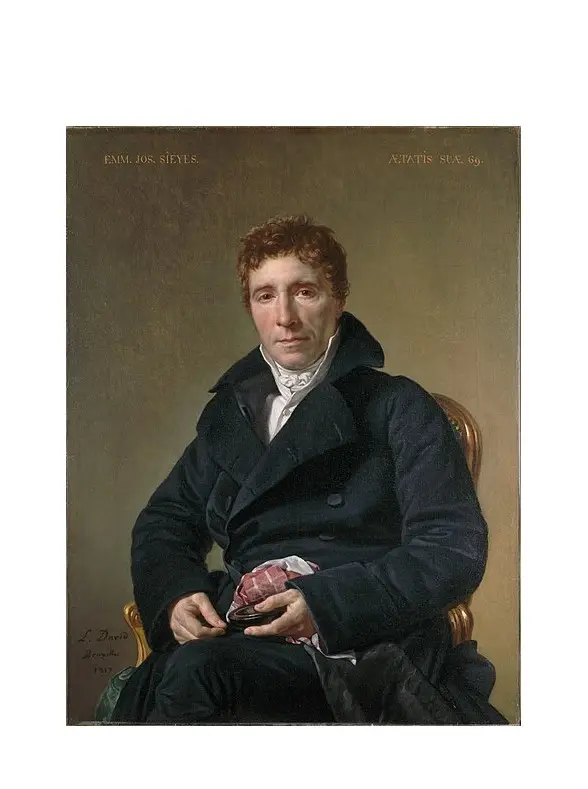
Emmanuel Joseph Sieyes by Jacques Louis David[/ Center]
In this article we will talk about Emmanuel-Joseph Sieyes (Sieyes), who became one of the founding fathers of the French Republic. Honoré de Mirabeau, author of the "Declaration of the Rights of Man and of the Citizen", "Tribune of the Republic" and "Eldest Son of the Revolution", respectfully called him "our dear teacher».
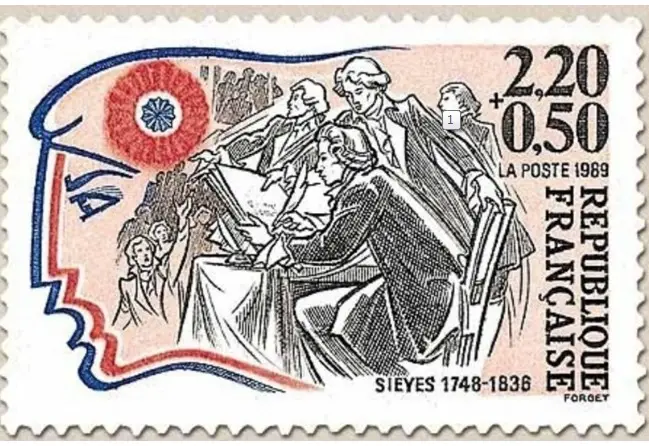
Sieyès on a French postage stamp
It was Sieyès who came up with the idea of abolishing the Directory and establishing a Consulate. Napoleon Bonaparte, according to his plan, was supposed to deal only with military affairs - he assigned the main role to himself.
Origin and life before the revolution
Emmanuel-Joseph Sieyès was born on May 3, 1748 in the southern French city of Fréjus, to whose port the frigate Muiron later arrived with Bonaparte, who had “escaped” from Egypt. The hero of the article was the fifth child in the family of a poor local official who, being a commoner, tried to ascribe to himself a “noble” origin.
The first educational institutions that Emmanuel-Joseph attended were the Jesuit school and the college of the monastic order of the Doctrinaires in the city of Draguignan, located 80 km from Nice. At the age of 17, Sieyès went to Paris, where he entered the seminary of Saint-Sulpice (St. Sulpicius), of which Talleyrand, for example, was a graduate. For unclear reasons, after 5 years he was forced to transfer to the less prestigious theological seminary of the Lazarist Fathers. Sieyès never showed any particular interest in theological sciences (he was more interested in philosophy and music) and, according to the grades given to him, he was in 54th place out of 80 students.
Another 2 years later, on July 28, 1772, he received the rank of priest, and in 1774 - a theologian's license. Sieyès managed to get a position as secretary to Bishop Treguier (in Brittany), and then, in 1780, together with his “patron”, he moved to Chartres, where he became the chief of the 30 vicars of Chartres Cathedral. Here Sieyès was mainly engaged in economic affairs. By that time, he had already become convinced that in career advancement, nobles, regardless of their personal qualities, had a huge advantage compared to him, a commoner. Talleyrand, for example, became an abbot at the age of 21, and Bishop of Autun at the age of 34.
On the other hand, Sieyès already then “freed from all superstitious feelings and ideas", later he even supported the idea of establishing a "Cult of Reason". But his religious career gave him at least some chance for a more or less decent future. He also tried himself as a writer and publicist, and in 1780 he even coined the word “sociology”. The next time this term will be used only 50 years later - by the philosopher Auguste Comte. In 1788, Sieyès was elected to the provincial assembly of Orléans as a member of the clergy. In the same year he wrote “Essai on Privileges” (“Essai sur les privilèges”).
Sieyès wrote well, but did not have the talent of an orator: according to the memoirs of his contemporaries, “spoke little and poorly" By the way, another famous person from clerical circles, Charles Maurice Talleyrand, was not a good speaker. And this was a serious drawback: the people valued fiery speakers, and many populists and irresponsible demagogues then broke into high positions. However, both Sieyès and Talleyrand reached the heights of political Olympus, which eloquently testifies to how high their business qualities and talents were, necessary for statesmen.
Member of the Estates General
France has long been in a state of crisis. The treasury was empty, discontent was growing among the people, many educated people were already openly talking about the excess of the king’s powers and the need to reform the outdated system of power. Louis XVI and his entourage decided to “play ahead” and shift the adoption of unpopular decisions (we were talking about new taxes) to the Estates General.
This consultative representative body was convened not only in France. In England, the Estates General met in 1254, when the issue of financing military operations was decided. In Holland in 1579, at a meeting of the Estates General, a decision was made to unite seven provinces into a single state. In France, the Estates General was first convened in 1302 and since then has met periodically to make important decisions on financial matters, foreign and domestic policy.
The last convocation of this body dates back to 1614, and therefore on July 5, 1788, Louis XVI issued a rather curious decree, according to which anyone who had information about the procedure for convening and organizing the activities of the Estates General had to contact the Keeper of the Seal. The deputies were representatives of three classes - the clergy, the nobility and the so-called “third”, which included all other groups of the population (94% of the total population of the country). Representatives of the third estate did not have any political rights, and yet it included not only poor peasants and artisans, but also rich merchants and highly educated people - doctors, university professors, lawyers, writers, journalists. The commoner Sieyes was elected as a deputy to the Estates General precisely from the Third Estate.
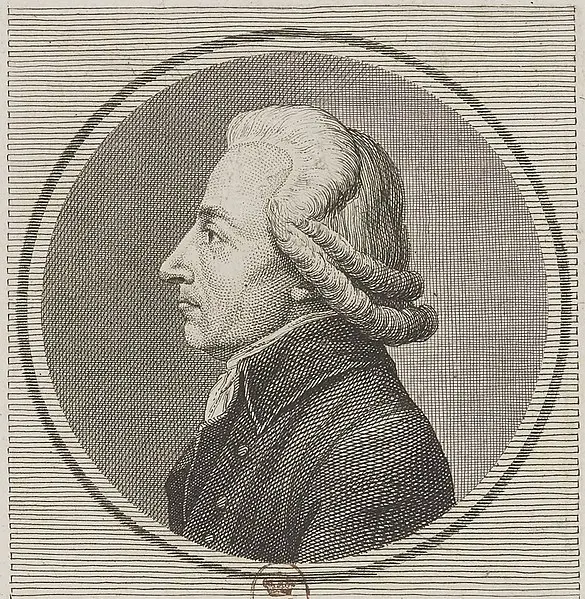
Sieyès in 1789 in an engraving by Courbet
Each class, regardless of the number of deputies, had its own “collective vote”, equal to the votes of any other. That is, the deputies of the first and second estates were guaranteed to fail any initiative of their “colleagues” of the third estate.
Even before their work began, at the beginning of 1789, Sieyès published a pamphlet that became widely known, “What is the Third Estate?” (“Qu’est ce que le tiers-état?”), which contained the following lines:

Le Tiers Etat
This document became the policy document for all deputies of the third estate and had a huge impact on the further course of events. William Sewell later wrote that Sieyès's work established "tone and direction of the French Revolution».
Sieyès argued that only the third estate could become the basis of a single nation - “society of people living under a common law and represented by one legislative institution":
He also suggested that representatives of the first two estates submit to general laws, since, in his opinion, having privileges, they cannot be considered members of the nation, since “are not part of a public organization at all" Moreover, the privileged classes are a burden to the nation. The data, which today seems completely natural and, of course, fair, the demands for the equality of all people before the law for the nobles and higher clergy turned out to be completely unacceptable. And therefore, the convening of the Estates General, instead of defusing the situation in the country, led to a revolution that swept away class privileges. It all ended with the abolition of the monarchy and the proclamation of a republic in 1792.
Sieyès was an ardent supporter of the creation of a unified French nation. J. Van Deusen wrote about the territorial and administrative division of royal France:
And Sieyès addresses the inhabitants of the French provinces:
The edict on the convening of the Estates General was published on January 24, 1789, the first meeting of this body took place on May 5 of the same year - in the “room for small amusements” of the Palace of Versailles. Louis XVI immediately warned the deputies against “dangerous innovations"and stated that their only goal is to find funds to replenish the state treasury. And already on May 6, the disappointed deputies of the third estate separated from the others. An attempt at reconciliation made by Mirabeau (a nobleman elected from the third estate) was unsuccessful. On June 20, in the “ball game hall,” the deputies of the third estate took an oath not to go home until they drafted a constitution. It was Sieyès who wrote the text of this oath.
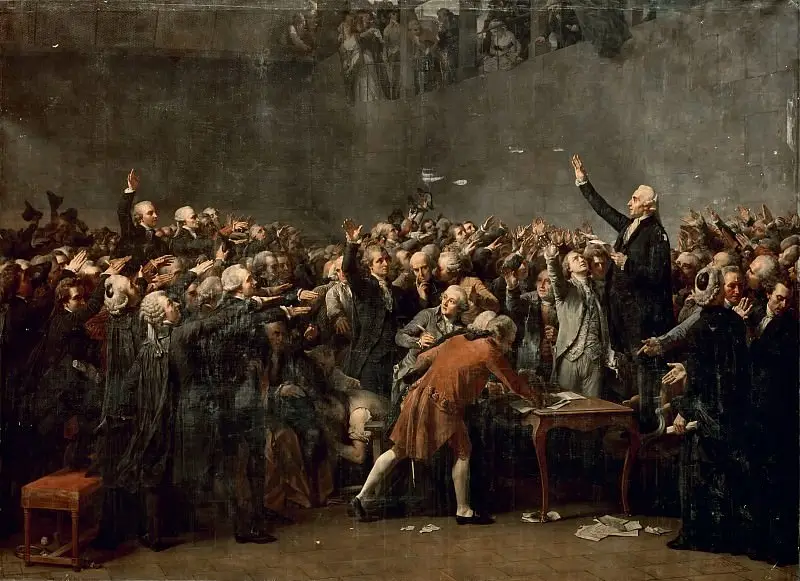
Auguste Couder. "Oath in the ballroom, June 20, 1789"
On June 23, the king ordered them to disperse, but did not dare to insist on his decision. Deputies of other classes began to go over to the side of the disobedient deputies. The guards sent to disperse them were stopped by the Marquis Lafayette and some other nobles. On June 27, Louis XVI actually admitted his defeat, giving the order to the deputies loyal to him to join the “rebels”: the Estates General were transformed into the National Assembly, then, on July 9, into the Constituent National Assembly, the main task of which was declared to be the preparation of a constitution. Sieyès, who wrote the pamphlet Reconnaissance et exposition des droits de l'homme et du citoyen, the forerunner of the Declaration of the Rights of Man, became a member of the constitutional committee and opposed the right of "absolute veto" for the King of France , of which Mirabeau was a supporter. In 1790, Sieyès served for some time as acting president of the National Assembly. He refused the position of constitutional bishop of Paris, offered to him in 1791.
Activities of Sieyès during the French Revolution
Talking about Sieyes, they often cite his answer to the question: what did he do during the years of terror?
In the USSR and Russia they usually give this translation option: “I was surviving- and we see before us a pathetic cowardly opportunist. But the correct translation is:
That is, Sieyès said that it was then that he lived a bright and full life, and now he is just living it out. And we see a different person - a clever and self-confident intriguer, about whom other deputies said:
Here again it’s a matter of nuances: Sieyès is not hiding behind a curtain at all, he is an unnoticed puppeteer, pulling the strings of control of the puppets. And Talleyrand compared Sieyès to a chess player who uses people as pieces - promotes his supporters, or, if necessary, sacrifices them.
The all-powerful Maximilian Robespierre wrote with alarm about Sieyès:
But here is what another “strong man”, Bertrand Barère, gives to Sieyès:
Sieyès was never a coward; it was he who, at the decisive moment of the coup of the 18th-19th Brumaire of the VIII year of the Republic (November 9-10, 1799), calmly said to Bonaparte, who was confused under the pressure of the deputies of the “Council of Five Hundred”:
But let's not get ahead.
Even before the meetings of the Estates General began in Versailles, the Breton Club was founded, whose members initially became deputies who arrived from this province. Its meetings quickly became popular, and more and more deputies from other regions joined them. Later, the Breton Club was transformed into the “Society of Friends of the Constitution” (then the “Society of Friends of Liberty and Equality”), whose meetings were held in the monastery of St. James. This is how the famous Jacobin Club appeared, one of the founders of which was Sieyès.
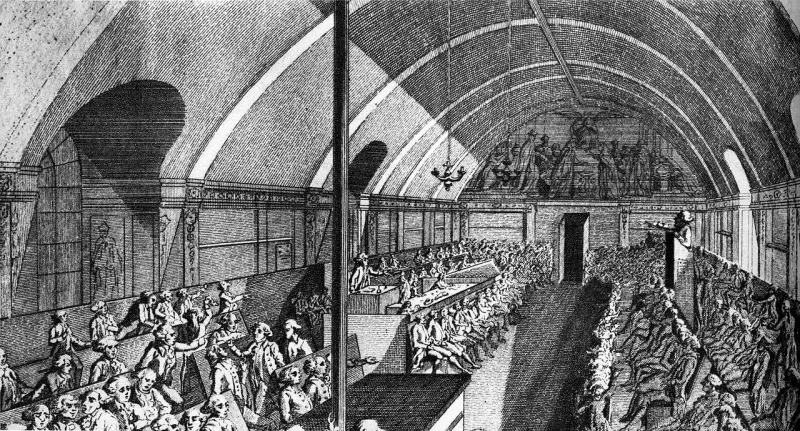
Meeting of the Jacobin Club in the library hall of the monastery of St. James in an engraving based on a painting by Henri-Nicolas Van Gorp
But, with the growing radicalism of the Jacobins, Sieyès, as well as some other founders of the Jacobin Club - Mirabeau, the Lamet brothers, moved to the so-called "Patriotic Society of 1789", which consisted of liberal monarchists, including Condorcet, Talleyrand, Bailly and Lafayette . On July 18, 1791, this society was transformed into the Feuillants (Feiyanov) club. For some time, Sieyès had to go into the shadows, because, at the suggestion of Robespierre, members of the Constituent Assembly were denied the right to run for a new representative body - the Legislative Assembly. Sieyès returned to big politics in September 1792, when he was elected to the National Convention of the French Republic. In January 1793 he voted for the execution of Louis XVI.
Sieyès is usually classified as one of the deputies of the “Plaine”. In our country, this group of deputies (about 400 people) is often pejoratively called “The Swamp,” but they got their name only from the seats in the lower part of the hall that they occupied during the meetings. And the radicals sitting at the top (“on the mountain”) were known as “Montagnards.” It was they who contemptuously called the “Plain” a “swamp”, and the deputies of the “Plain” - “swamp toads”. One of the leaders of the “Plain” was Paul de Barras, for whom this nickname did not suit him at all.
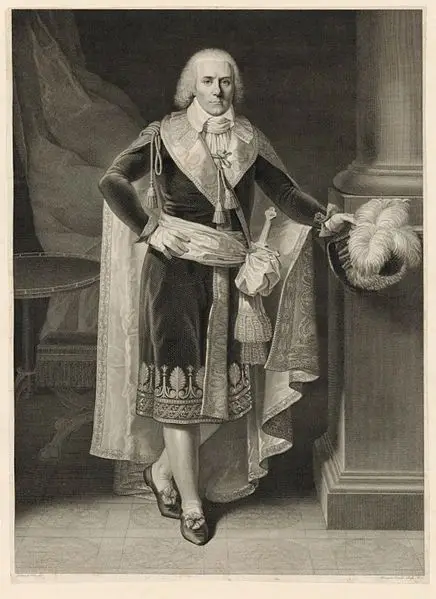
Paul François Jean Nicolas Viscount de Barras in an engraving by Tardieu
He patronized the young Bonaparte and even “from the master’s shoulder” gave him his mistress, Josephine Beauharnais.
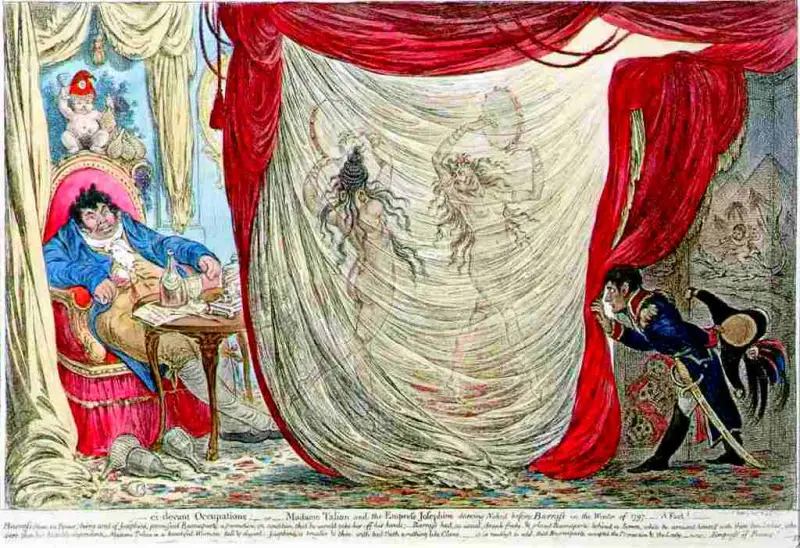
Therese Tallien and Josephine Beauharnais dance naked in front of Barras, Napoleon spies on the right. Cartoon by James Gillray
The deputies of the “Plain” (like the Girondins, and even some Jacobins), in turn, called the most radical and extremist-minded deputies “mad.”
With the beginning of the Great Terror, Sieyès withdrew from active political activity, but, as we remember, actively participated in intrigues, which caused concern to both Robespierre and Barère. After the Thermidorian coup (July 27-28, 1794), during which “the scoundrels rid France of fanatics"Sieyes joined the Committee of Public Safety. In the spring of 1795, for a short time (from April 20 to May 4) he was chairman of the Convention. In the same 1795, he signed an agreement between the French and Batavian republics in The Hague. He refused the posts of “director” and minister of foreign affairs, worked in the Council of Five Hundred (lower house of parliament) and in 1797 even headed it. He became one of the first members of the future Academy of Moral and Political Sciences of the Institute of France. Survived an attempt on his life by the Abbot of Puli. After recovery, he was sent as ambassador to Berlin, in this position he held from June 21, 1798 to May 24, 1799, and achieved the preservation of Prussian neutrality.
But Sieyès's main intrigue was ahead. Returning to Paris in June 1799, less than six months later he organized a coup d'etat, as a result of which Napoleon Bonaparte came to power. At the same time, Sieyès was also “behind schedule”, since General Barthelemy Joubert, who was originally chosen by this “puppeteer”, inappropriately went to Italy to fight against Suvorov (and died there in the Battle of Novi). But we will talk about all this in a separate article.
Information